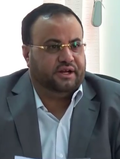Contents
| |||||
| Decades: | |||||
|---|---|---|---|---|---|
| See also: | Other events of 2018 | ||||
Events in the year 2018 in Yemen .
| |||||
| Decades: | |||||
|---|---|---|---|---|---|
| See also: | Other events of 2018 | ||||
Events in the year 2018 in Yemen .

Prosecutor Mohammed Ali Saleh confirmed the release of the 46 on Tuesday, without elaborating, while the detainees themselves gave The Associated Press a list with their names.
{{cite web}}: CS1 maint: numeric names: authors list (link)Fifty wounded rebels will be evacuated from the Yemeni capital for medical treatment on Monday, a Saudi-led military coalition said, as the UN envoy landed in Sana'a ahead of planned peace talks in Sweden.
A plane carrying 50 wounded Houthi rebel fighters has left the Yemeni capital Sana'a in a critical confidence-building measure before peace talks can get under way in Stockholm as early as Wednesday.